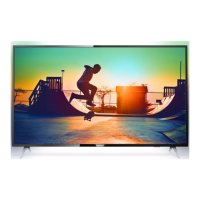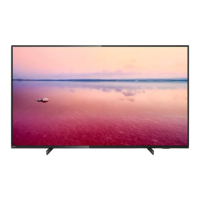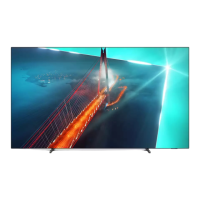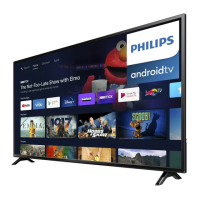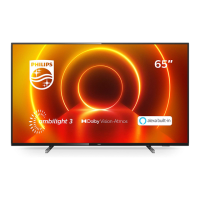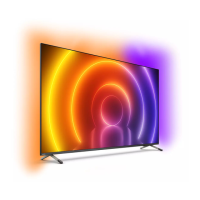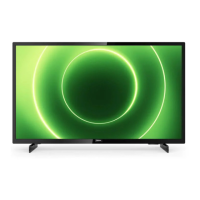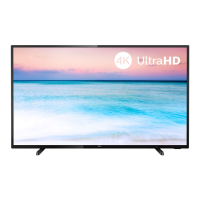Do you have a question about the Philips 6100 series and is the answer not in the manual?
Connect to the internet for a new world of television and apps.
Browse and use tailored websites and apps for TV entertainment.
Rent and watch the latest movies from your regional online video store.
Access social network pages directly from your TV.
Pause and record broadcasts using a USB Hard Drive.
Optimize TV settings for gaming and play split-screen games.
Operate connected devices like Blu-ray players with the TV remote.
Read safety instructions before using the TV.
Guidance on installing the TV stand or wall mounting bracket.
Recommendations for optimal TV placement and viewing distance.
Instructions for connecting the power cable safely and efficiently.
How to connect an antenna or antenna signal to the TV.
How to connect the TV to a wireless router and network.
Steps to connect the TV to a network using a wired connection.
Configure network settings like type, configuration, and Wi-Fi playback.
General advice on connecting devices and using cables.
Operate connected devices using the TV remote control via HDMI CEC.
Instructions for connecting a set-top box (digital receiver) to the TV.
Connecting and configuring a Home Theater System for audio output.
Connecting a Blu-ray Disc player using HDMI for optimal quality.
Connecting a DVD player to the TV using an HDMI cable.
Connecting game consoles via HDMI or composite cables.
Connecting a USB Hard Drive for pausing and recording TV broadcasts.
Connecting USB keyboards and mice for easier text input and navigation.
Viewing photos, music, and videos from a USB flash drive.
Connecting a digital photo camera to view photos on the TV.
Connecting a camcorder to the TV for viewing footage.
Connecting a computer to use the TV as a PC monitor.
Connecting headphones for private listening and adjusting volume.
How to put the TV into standby or turn it on.
Description of the TV's physical control keys.
Adjust or turn off the brightness of the PHILIPS word mark.
Explains the function of each button on the remote control.
Details on using the QWERTY keyboard on the remote control.
Information about the infrared sensor on the TV.
Instructions for pairing the remote control with the TV.
Information on replacing the batteries in the remote control.
Instructions for cleaning the remote control.
How to switch channels, use the channel list, and manage radio channels.
Updating, reinstalling, and installing channels.
Accessing on-screen help and looking up topics.
Installing channels or adjusting TV settings.
Accessing TV channels.
Opening the Smart TV start page for internet access.
Switching to connected devices or activities.
Opening a list of current and scheduled TV programs.
Opening the list of recordings and scheduled recordings.
Requirements for viewing TV guide information.
Navigating, tuning to programs, and setting reminders in the TV guide.
Recording TV programs or scheduling recordings using the TV guide.
Viewing connected devices and switching to them.
Turning on connected devices from standby using the TV remote.
Operating connected devices via HDMI CEC.
Setting the TV to switch to standby automatically after a preset time.
Changing clock mode, time zone, and setting the clock manually.
Deactivating the automatic switch-off timer.
Requirements for watching 3D, including glasses and content sources.
Overview, operation, and battery replacement for 3D glasses.
Wearing 3D glasses for viewing 3D programs.
Proper care and cleaning instructions for 3D glasses.
Tips for optimal 3D viewing and switching between 2D/3D.
Recommendations for the best 3D viewing experience.
Important health and safety warnings related to 3D viewing.
Connecting a game console and setting the ideal game picture mode.
Playing two-player games using 3D technology and split screens.
Accessing media files from USB devices or computers.
Sharing screens wirelessly from devices using Miracast.
Steps to pause, resume, and stop a broadcast.
Replaying the last 10 seconds of a broadcast.
Navigating the progress bar to select playback points.
Requirements for recording TV programs.
Recording the current program or scheduling future recordings.
Viewing, managing, and removing recorded programs.
How to cancel a scheduled recording.
Introduction to connecting to the internet for various services.
Requirements for using Smart TV features.
Initial setup and registration for Smart TV.
Locking adult-rated apps and setting a PIN code.
Opening and managing Smart TV applications.
Accessing the Smart TV start page.
Exiting the Smart TV interface.
Watching TV channels in a small screen alongside Smart TV apps.
Clearing internet memory to reset Smart TV connection.
Navigating the setup menu for picture and sound adjustments.
Easy-to-use settings for basic picture and sound preferences.
Accessing general settings like language, timers, and sleep timer.
Updating channel lists and reinstalling channels.
Setting language preferences, age ratings, and child lock codes.
Adjusting picture settings for optimal visual quality.
Adjusting sound settings for optimal audio experience.
Information on energy saving, screen off, and disposal.
Details on antenna input and TV system compatibility.
Information on screen size, resolution, and input formats.
Power requirements and consumption details.
Physical dimensions and weight of the TV.
Details on available input/output connections.
Supported connections, file systems, and playback formats.
Instructions for updating TV software via USB or Internet.
How to view the current TV software version.
Information about open-source software used in the TV.
Solutions for common problems like no channels, no picture, or no sound.
Troubleshooting steps for channel reception issues.
General troubleshooting for power, remote control, and startup issues.
Troubleshooting picture-related problems.
Troubleshooting sound-related problems.
Troubleshooting issues with HDMI and EasyLink connections.
Registering the TV for benefits and support.
Accessing on-screen help and downloading the user manual.
General safety precautions, electric shock risks, and injury prevention.
Instructions for securing the TV to prevent tipping.
Warnings about electrical hazards and fire prevention.
Precautions to prevent injury or damage during handling and installation.
Ensuring correct voltage matching before connecting the power.
Preventing falls by following placement and anchoring guidelines.
Warning about the danger of swallowing small batteries.
Ensuring adequate ventilation to prevent overheating.
Guidelines for cleaning and protecting the TV screen.
Warranty information, disclaimers, and compliance details.
Information on HDMI, Dolby, and other brand licenses.
| Display Technology | LED |
|---|---|
| Smart TV | Yes |
| HDR | HDR10, HLG |
| Operating System | SAPHI |
| HDMI Ports | 3 |
| USB Ports | 2 |
| Built-in Wi-Fi | Yes |
| Sound Output | 20 W |
| Refresh Rate | 60 Hz |
| Bluetooth | No |
| Resolution | 3840 x 2160 (4K Ultra HD) |
| Screen Size | 43-inch, 50-inch, 55-inch, 65-inch, 70-inch |
